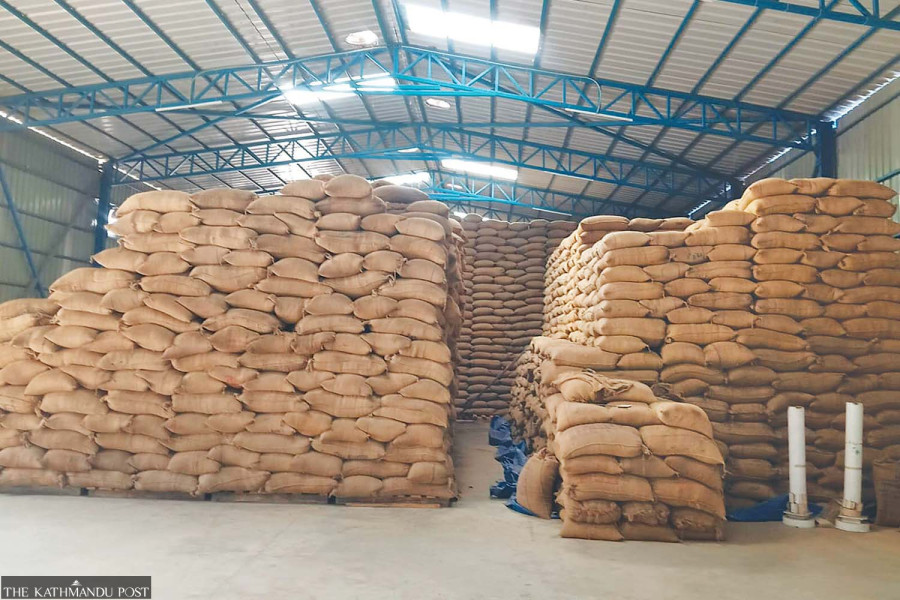Since July 20, India has maintained an embargo on non-basmati rice amid the threat of El Niño weather disruptions.

Neighbours Nepal and India are in a kitchen give and take.
While India has started importing tomatoes from Nepal amid a record-high spike in prices in the country, Nepal has written to the Indian government to send rice and sugar.
The first lot of tomato imports is likely to reach by Friday in Varanasi, Lucknow and Kanpur cities in northern India, Finance Minister Nirmala Sitharaman told the parliament in New Delhi, according to Reuters.
Tomato prices have surged more than 1,400 percent at the wholesale market to a record IRs140 ($1.69) per kg in the past three months in India, with farmers citing reasons including poor rainfall, higher temperatures and a virus outbreak that have hit the crop.
The export ban of non-basmati rice by India to boost domestic supply and keep retail prices under check has sent prices soaring in Nepal.
Against this backdrop, Nepal has formally asked the Indian government to make an exception and unshackle grain and sugar shipments to Nepal in view of the upcoming festive season.
The southern neighbour has banned exports of non-basmati rice considering its own needs.
Officials at the Ministry of Industry, Commerce and Supplies say they have made a request for 1 million tonnes of paddy, 100,000 tonnes of rice and 50,000 tonnes of sugar.
“Last week, we requested the Indian government through the foreign ministry to supply grains and sugar. We are yet to hear from the southern neighbour,” said Ramchandra Tiwari, joint-secretary at the industry ministry.
Since July 20, India has maintained an embargo on non-basmati rice to keep its food reserve intact amid the threat of El Niño weather disruptions.
Food prices normally increase during the festive period in Nepal as goods fly off the shelves with celebrators on a spending spree. Nepal is heavily dependent on imported food, mostly from India.
In the 2021-22 Indian fiscal year, which starts on April 1 and ends on March 31, Nepal imported 1.4 million tonnes of rice—1.38 million tonnes of non-basmati and 19,000 tonnes of basmati rice—from India, the highest import on record, according to an Indian government report.
In terms of value, rice imports came to $473.43 million or just over Rs60 billion.
Imports of basmati and non-basmati rice dropped sharply to 812,028 tonnes in 2022-23 as India strangled exports. The total value of the imports was $283.94 million or Rs37.48 billion.
Nepali traders say that immediately after India stopped the export of rice, retail prices jumped by Rs200 to Rs250 per 25-kg bag. They say that prices are expected to increase further, particularly during the festive season.
Dhurba Adhikari, joint treasurer of the Nepal Retailers Association, says that the price of rice is still on an upward trend. “We have been informed by wholesalers that prices of rice and other foods may rise further.”
Adhikari, who is also the proprietor of Adhikari Khadya Store at Tarakeshwar, said that retailers do not keep large inventories. “So the prices are determined by the wholesalers. We have heard that market inspections are being done, but they don't seem to be effective,” he said.
The price of edible oil has also started to rise. Soybean oil now costs Rs200 per litre, up Rs25 per litre. The price of other edible oils has increased by Rs10 to Rs15 per litre. Mustard oil costs Rs250 to Rs300 per litre depending on the brand.
The price of lentils has also increased by Rs10 to Rs15 per kg and now cost Rs220 to Rs230 per kg.
Consumer rights activists say that import delays may impact the market.
“If the government delays importing rice, wheat and sugar, black marketers will jack up prices again,” said Prem Lal Maharjan, president of the National Consumer Forum.
"The industry ministry has written to the finance ministry for approval to import rice, paddy and sugar from India, but the finance ministry has a track record of procrastination," said Maharjan. “Delays may create chaos in the market.”
Considering the Indian ban on non-basmati rice exports and the current weather phenomenon in Nepal, there may be a food crisis for a short period, say experts.
Poor people will be hit hard by the ban on non-basmati rice as they can't afford to eat basmati rice.
“The embargo has prompted price spikes globally. In Nepal too, prices are already up,” agriculture economist Devendra Gauchan told the Post in a recent interview.
"Requesting India to provide rice is not sufficient, the government should subsidise it to control inflation in the domestic market," said Maharjan.
The authorities claim that they have been actively conducting market inspections, but rights activists say they are not visible.
On July 30, the Department of Commerce, Supplies and Consumer Protection wrote to the government to inform all local levels to conduct market inspections amid complaints of unnatural price hikes.
Issuing a public notice on July 31, the commerce department asked traders to sell rice at the old prices after voices were raised against the abrupt price hikes that followed the Indian announcement.
The department also warned that lawful action would be taken if it was found that prices had been hiked unnecessarily.
"Warehouses were raided in some parts of the country," said Maharjan. “But market prices have not come down as expected.”
On Tuesday, officials of the concerned ministries and departments, including secretaries of the industry ministry, director generals of the commerce department, Nepal Bureau of Standards, Food Technology Department and officials of food supply bodies met to discuss possible responses to India’s move.
According to Nepal’s central bank, the year-on-year consumer price inflation remained at 6.83 percent in mid-June compared to 8.56 percent a year ago.
Food and beverage inflation stood at 5.66 percent in the review month. Under the food and beverage category, the price index of spices increased by 35.29 percent, cereal grains and their products by 13.06 percent, and milk products and eggs by 10.98 percent.












